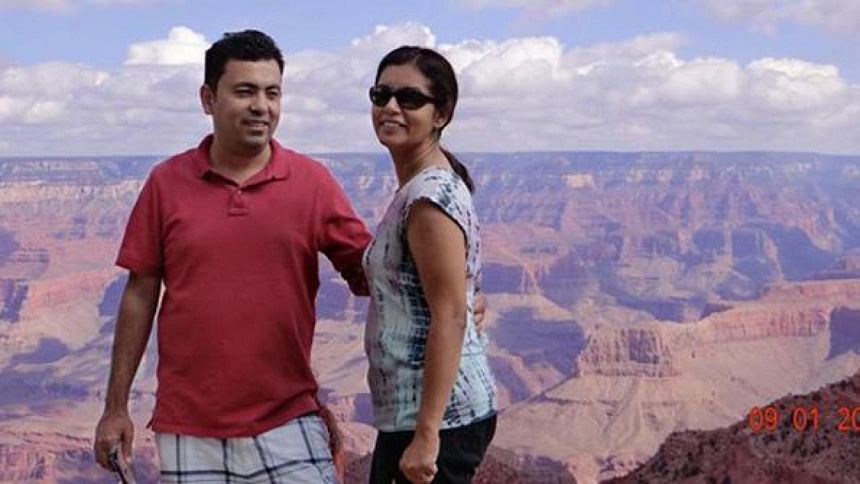‘Prosecuting few foot-soldiers and ignoring rise of extremism isn’t justice for Avijit’s death’

Rafida Ahmed Bonya, widow of slain blogger-writer Avijit Roy, today released a statement following the verdict in the murder case, in which she wrote, "Simply prosecuting a few foot-soldiers -- and ignoring the rise and roots of extremism -- does not mean justice for Avi's death, nor for the deaths of the 'bloggers, publishers and homosexuals' before and after him as part of the serial killing."
Bonya uploaded the statement on her verified Facebook profile. She was injured in the attack that killed her husband in 2015.
A Dhaka tribunal today sentenced five members of banned militant outfit Ansar al Islam to death and another to life in jail for killing Avijit.
"The main two culprits -- Sayed Ziaul Haque, the top commander, and Akram Hossain, the top operative of the militant group that attacked us -- have never been caught," she stated.
"Last week (in the verdict following the murder of Avi's publisher, Faisal Arefin Dipan, in 2015), we learned that Haque continued to mastermind the serial killings of other secular writers and publishers for eight months after Avi and I were attacked. And yet, Bangladeshi authorities failed to put him behind bars.
"Avi died, I barely survived and then the killing spree continued for another year," she wrote.
She said that in the last six years, not one person investigating the case in Bangladesh reached out to her, even though she is a direct witness and victim of the attack.
"In January, the state lawyer in the case publicly lied, saying that I did not agree to be a witness in the trial. The truth is, no one from Bangladesh's government or the prosecution has ever contacted me," she said in her statement.
However, the Assistant Public Prosecutor Golam Sharuar Khan claimed to The Daily Star that she was summoned on December 11, 2019 to appear as a witness on December 30.
She questioned certain aspects of the investigation.
"On February 26, 2015, Avi and I were invited to meet a group of science writers. The people who organized that event kept us waiting for hours. Finally, we met the group in the evening. After the event, we were attacked, and Avi was killed. Were the organizers of that event ever investigated? What was the outcome?" she said.
She further asked why an alleged militant involved with the attack on her and her husband was killed in an extra-judicial killing.
"Today, civilized countries cannot get away with extrajudicial killings. But in 2016, Bangladeshi police carried out the extrajudicial killing (via "crossfire," as it's commonly called in Bangladesh) of Mukul Rana 'Sharif.' He was reportedly a top operative of the militant group that attacked us. Sharif was in police custody for months before the authorities killed him. Why was Sharif killed?" she questioned.
Bonya concluded by saying that Bangladesh's government has become more autocratic since they were attacked. "Freedom of speech has been restricted further, secular writers, bloggers, activists were forced to leave the country during and after 2015, a harsher Digital Security Act has been enacted, bloggers, writers, publishers have been persecuted for their writings on a regular basis." Bangladesh's authorities are "increasingly friendly with Hefazat-e-Islam, the Islamist group of madrassah teachers and students, that demanded 'the heads' of secular writers and bloggers in 2014," she said.
She pointed out that Dipan murder case verdict from last week includes a line that states in 2015, money used to flow in to kill "bloggers, publishers and homosexuals in the country."
"I want to know who has investigated this flow of money?" she asked. "What will these verdicts accomplish, if we don't get to the source of the money -- or rather, to the source of the killings?"

 For all latest news, follow The Daily Star's Google News channel.
For all latest news, follow The Daily Star's Google News channel. 



Comments